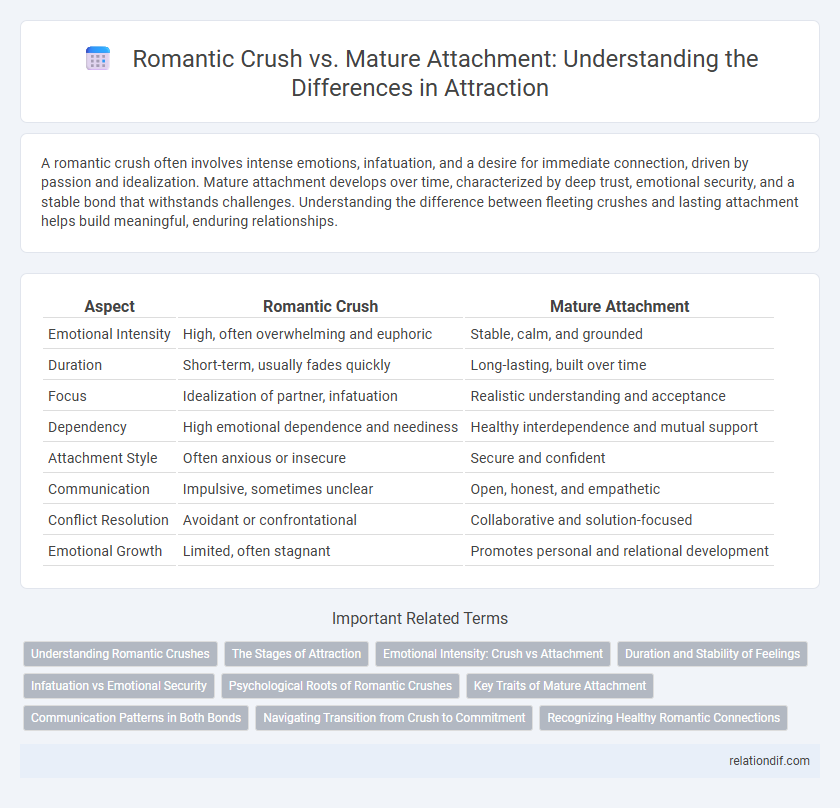A romantic crush often involves intense emotions, infatuation, and a desire for immediate connection, driven by passion and idealization. Mature attachment develops over time, characterized by deep trust, emotional security, and a stable bond that withstands challenges. Understanding the difference between fleeting crushes and lasting attachment helps build meaningful, enduring relationships.
Table of Comparison
| Aspect | Romantic Crush | Mature Attachment |
|---|---|---|
| Emotional Intensity | High, often overwhelming and euphoric | Stable, calm, and grounded |
| Duration | Short-term, usually fades quickly | Long-lasting, built over time |
| Focus | Idealization of partner, infatuation | Realistic understanding and acceptance |
| Dependency | High emotional dependence and neediness | Healthy interdependence and mutual support |
| Attachment Style | Often anxious or insecure | Secure and confident |
| Communication | Impulsive, sometimes unclear | Open, honest, and empathetic |
| Conflict Resolution | Avoidant or confrontational | Collaborative and solution-focused |
| Emotional Growth | Limited, often stagnant | Promotes personal and relational development |
Understanding Romantic Crushes
Romantic crushes trigger intense emotional and physiological responses characterized by heightened dopamine levels and obsessive thoughts about the object of affection. These infatuations often involve idealization and uncertainty, leading to fluctuating moods and heightened arousal. Understanding romantic crushes requires recognizing their temporary nature compared to the stability found in mature attachment.
The Stages of Attraction
Romantic crushes typically involve intense, immediate attraction characterized by heightened dopamine and norepinephrine levels, leading to infatuation and idealization of the partner. Mature attachment develops over time through consistent emotional bonding, trust-building, and oxytocin release, fostering deep connection and security. Understanding these stages highlights the transition from passionate, short-term excitement to stable, long-term relational commitment in human attraction.
Emotional Intensity: Crush vs Attachment
Romantic crushes are characterized by intense emotional highs and overwhelming passion, driven by idealized perceptions and infatuation. Mature attachment involves deeper emotional stability and lasting connection rooted in trust, understanding, and mutual support. Emotional intensity in a crush is often fleeting and volatile, whereas attachment fosters consistent warmth and resilience over time.
Duration and Stability of Feelings
Romantic crushes often involve intense, short-lived emotions characterized by idealization and excitement that typically last a few weeks to months. Mature attachments develop over time, marked by deep emotional stability, trust, and commitment that endure for years or even a lifetime. Duration and stability of feelings in mature attachment are supported by consistent communication, shared experiences, and mutual respect, distinguishing it from the fleeting nature of a romantic crush.
Infatuation vs Emotional Security
Romantic crushes often trigger intense infatuation, characterized by obsessive thoughts and heightened physical attraction driven by dopamine surges. Mature attachment emphasizes emotional security, fostering trust, deep connection, and stability through oxytocin and vasopressin release. This distinction highlights the transition from initial passion to enduring love defined by commitment and mutual understanding.
Psychological Roots of Romantic Crushes
Romantic crushes stem from intense dopamine-driven reward pathways in the brain, creating feelings of euphoria and obsession often linked to idealized perceptions rather than reality. These crushes activate the limbic system, especially the amygdala and hypothalamus, triggering emotional arousal and physical attraction rooted in novelty and uncertainty. Unlike mature attachments, which rely on oxytocin and vasopressin promoting long-term bonding and trust, romantic crushes are primarily influenced by neurotransmitters associated with excitement and short-term desire.
Key Traits of Mature Attachment
Mature attachment is characterized by deep emotional security, mutual respect, and consistent support between partners, fostering a stable and nurturing relationship. Unlike the intense infatuation of a romantic crush, mature attachment involves balanced interdependence where both individuals maintain their autonomy while prioritizing shared goals. Trustworthiness, effective communication, and prolonged commitment are key traits distinguishing mature attachment in attraction dynamics.
Communication Patterns in Both Bonds
Romantic crushes often involve intense, rapid communication characterized by frequent texting, emotional highs, and uncertainty in tone, reflecting infatuation and idealization. Mature attachment exhibits steady, consistent communication with clear, empathetic exchanges that foster trust, emotional security, and mutual understanding. These patterns highlight how romantic crushes emphasize excitement and immediacy, while mature bonds prioritize depth and stability in connection.
Navigating Transition from Crush to Commitment
Romantic crushes ignite intense emotional and physical attraction, driven by idealization and novelty, while mature attachment is characterized by deep trust, emotional security, and mutual respect. Navigating the transition from crush to commitment requires prioritizing open communication, understanding emotional needs, and fostering shared experiences that build a solid foundation of trust. Successful evolution between these phases enhances relationship longevity and promotes healthy intimacy.
Recognizing Healthy Romantic Connections
Romantic crushes are intense, often idealized feelings driven by infatuation and physical attraction, while mature attachment is characterized by deep emotional bonds, trust, and mutual respect. Recognizing healthy romantic connections involves identifying consistent support, open communication, and shared values rather than fleeting excitement. Emotional stability and genuine care are key indicators that differentiate mature attachment from temporary romantic crushes.
Romantic Crush vs Mature Attachment Infographic

 relationdif.com
relationdif.com